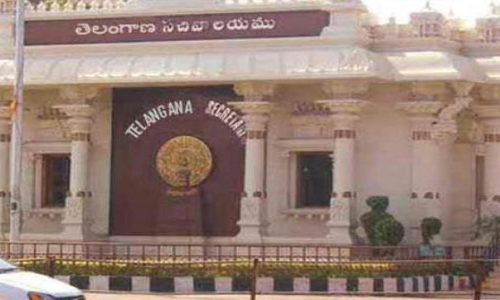Live
- BJP MP candidate Bharat Prasad visited the student who tried to commit suicide
- PM’s popularity in the fast lane: Autos with 'Har Dil Mein Modi' slogan spotted across Delhi
- Delhi-based political parties are like East India Company: Sukhbir Badal
- Golf: Diksha moves into Top-20 at South African Women’s Open
- KCR lashes out against BJP and Congress for destroying Telangana
- Dairy Science students visited the Milk cooling plant
- Moody feels Pant ahead in keepers’ race for T20 WC squad; Srikkanth picks Rahul over Samson as reserve keeper
- Thanking voters for extending 'unparalleled support' to NDA, PM Modi says second phase 'too good'
- Natural Relief for Menstrual Cramps: Beetroot Juice Recipe
- Asha Worker died in a road accident
Just In
Secretariat officials misinterpret Right to Information (RTI) Act


Notwithstanding the tall talk by the government, the officials at the Telangana Secretariat are making every effort to subvert the provisions of the Right to Information (RTI) Act. The Hans India on March 27 submitted an application to the Agriculture and Cooperation Department under the provisions of the RTI Act, seeking information on 100 subjects,
Hyderabad: Notwithstanding the tall talk by the government, the officials at the Telangana Secretariat are making every effort to subvert the provisions of the Right to Information (RTI) Act. The Hans India on March 27 submitted an application to the Agriculture and Cooperation Department under the provisions of the RTI Act, seeking information on 100 subjects,
including the proposals forwarded to the heads of departments to implement welfare programmes, the number of files pending with the department, the guidelines followed by the officials for clearing the pending files, the budget allotted by the government to the department, the expenditure incurred by the Ministers during field trips, new enactments, guidelines prepared to prevent corruption in the department and the number of RTI applications the department received so far, among others.
The Public Information Officer (PIO), who received the application, while brushing aside the application, stated, “It is to inform that the information sought for in the petition in the application does not constitute definition under section 2(f) of RTI Act, 2005.”
The PIOs of Vigilance, Coop-I, Coop-II, Horti and Seri, and Agri-I sections of the same department stated in their reply, the information sought for do not fall under Section 2(f) of the RTI Act.Section 2 (f) of the RTI Act clearly states, "Information" means any material in any form, including records, documents, memos, e-mails, opinions, advices, press releases, circulars, orders, logbooks, contracts, reports, papers, samples, models, data material held in any electronic form and information relating to any private body which can be accessed by a public authority under any other law for the time being in force.
The same application was submitted to the Consumers Affairs, Food and Civil Supplies Department. However, its PIO forwarded some of the points to the offices of Ministers to give information. He stated that the department is following Business Rules and Secretariat instructions and Secretariat office manual for clearing files. Referring to the budget the answer was ‘NIL.’ With reference to the field visits of the Ministers and other queries the PIO stated,
“Matter pertains to all the HODs under the control of CAF&CS Department, hence they were requested to furnish the information to the applicant directly.”With reference to the number of applications received under RTI, it was stated, “It is informed that 29 applications were received and furnished / forwarded within stipulated time.”
When the same application was submitted to the Disaster Management (Revenue department), the PIO of the section, regretting that they could not provide information, stated that they need not provide information to the applicant under Section 9 of the Act, when the expenditure was at high level, when the security of the record becomes vulnerable. Section 9 is applicable when the record is very old and in a dilapidated condition. However, the applicant could be allowed to visit the office and inspect the records in such a case.
This is the pathetic condition of the implementation of the Right to Information Act under one pretext or other. If the PIOs resort to such unconstitutional ways, how do the citizens get information?
By Ganji Srinivasa Rao

© 2024 Hyderabad Media House Limited/The Hans India. All rights reserved. Powered by hocalwire.com






